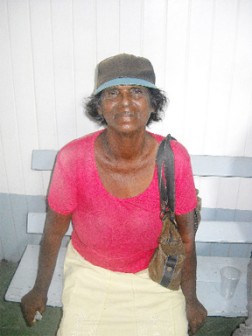Every morning, Kammerool Azeez, 71, gets up and treks down to Camp Street, between Robb Street and North Road, where she begs every passerby for help.
“A begging you for a help,” she says to all passers-by.
“I gaffa do this because I can’t work and me ent get nobody to help me. All me family dem dead out and dem who alive don’t care,” Azeez told Stabroek News in an interview.
She was reluctant to speak, preferring instead to remain on Camp Street to get some more money for the day. However, she eventually relented and spoke about her life and the fact that she was not happy with the way it turned out.

Azeez’s memory is not all there; there are large chunks of her life story that she has either forgotten or chooses not to remember. She knows her name, which she spells very easily, and is positive that she was born on January 31, 1940, although she says she does not know her age.
She recalls that she was the only child for her parents; that she was born in D’Andrade Street, Newtown Kitty and that her childhood days were good ones, up until her parents died. While she says she cannot recall how old she was then, she says she was “put out the house because some people want it.”
She also remembers attending St Winifrede’s Primary School before her parents died, and later, working as a domestic, which she says is the only job she has ever had. According to Azeez, she worked for many years with a woman and when the woman migrated, she took to begging to earn.
She is not clear on where she lived all the years before she ended up in Hadfield Street on the back stairs of a hotel. She says she had a son but he was taken as a child to New York by an aunt and she never heard of him again.
“No he don’t contact me or nothing I never hear back from he. Some family ain’t good and is just me now…” she says, as tears rolled down her cheeks.
She would not discuss the father of her son but says she was never married.
Husband
Azeez is currently in a new relationship, although her previous partner died in February. She was not legally married to him as “he had he married wife” but she refers to him as her “husband.”
The man she called her husband made the journey with her to Camp Street every day and he could be observed sitting some distance away from her in the shade as she begged. Sometimes, he would be heard shouting at her and she could be seen racing away from him. Because of his poor health he was unable to follow her.
It was obvious that the two shared a tumultuous relationship but when asked about this, Azeez is adamant that the man was not abusive to her. “He never hit me. What he used to do is correct me when I do wrong. And is when I don’t hear when he correct me is then he used to get vex,” she says.
Earlier this year, the man was admitted to the Georgetown Public Hospital, where he died. “He dead right here,” she says, patting her shoulder, “on me shoulder. He know he woulda dead and he tell me ‘Kammi you guh punish now’ but I tell he I can’t punish more than how me done punishing now.”
That was the last time she saw him. She did not attend his funeral since he “had a married wife and children and me just lef he deh at the hospital when he dead.”
Before he died, the two spent their nights on the back steps of the hotel and the money she got from begging was used to provide meals for them. The owner of the hotel allowed them to use the bathroom and toilet facilities and in return she would weed the yard. “I use to weed the yard but then I get cataract in me eye and couldn’t see properly so I couldn’t do it anymore,” she explains. “I use to tek me fingers and pick out the grass because dem deh fine, fine,” she adds, when asked how she managed the weeding.
After her partner died, Azeez said, she was asked to leave the hotel as she was of no more use to the owner. “She just tell me to come out she place and go with me man and I leave,” the woman said as she started to cry.
She admitted that by then she had another “husband” and she moved in with him in Hadfield Street. She was not too keen on divulging much about her current relationship but would only say the man works in the night while she begs in the day. Although she does not say it outright, many days the money she receives from kind-hearted persons is not spent on her but it goes to her “husband.”
The new relationship is also stormy. Sometimes her new partner locks her out and she is forced to sleep on the steps. She says she has no other choice.
The morning after she spoke with this newspaper, Azeez was seen on Camp Street in the same attire she had on the previous day. “You see he lock me out last night, he go with the key and I had to sleep on the steps so me aint get to bathe me skin and change me clothes. I just get up and come out early. You see when you don’t get family wah does happen to you?”
Dangerous
The streets can be dangerous. It is not just the insults and the occasional objects pelted at her by children that Azeez must contend with. Just last year, she had her left hand fractured in two places by a fellow beggar. “He get a life sore on he foot and he does come out at Camp Street some time and beg from dem vehicle. One day me went to dem vehicle to beg too and he get vex and tek the iron stick he does walk with and lash me,” she tearfully recalls.
She was forced to visit the hospital and her hand was placed in a cast for weeks before the fractures were mended. “And the thing use to scratch me and I deh just praying fuh it to come off,” she says, while adding that even with the cast on, she still made the journey to the streets to beg.
For Azeez, the very real possibility that she would die on the streets was reiterated just about a week ago, when a woman with whom she shared the Camp Street space died. “She dead. She dead four days ago,” she tells a passer-by who enquires about the woman, after noticing that she was no longer at her usual spot.
There was no love loss between them. According to Azeez, the woman shortened her daily collection. As a result, she was very upset when the woman joined her on the stretch of the road. “But she had a young husband and is he come and tell me that she dead and he say is just he and she son build a box and bury she. Me when I dead is the government guh bury me because me ent gat no family,” she says, shaking her head.









